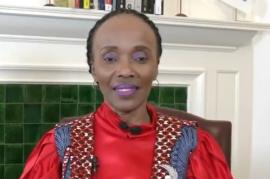
JOHANNESBURG, Aug 2 (NNN-SANEWS) — South Africa will over the next five years focus on strengthening and monitoring systems that are meant to advance gender equality and women empowerment.
Speaking at the official launch of Women’s Month 2025 at the Sandton Convention Centre in Johannesburg on Friday, Sindisiwe Chikunga, the Minister of Women, Youth and Persons with Disabilities, said this will be underpinned by a robust evaluation function and ensuring accountability across all spheres of governance to ensure that women empowerment takes place.
Chikunga outlined critical developments aimed at institutionalising gender-responsive governance.
She said a key development is the upcoming Promotion of Women’s Rights, Empowerment and Gender Equality Bill, which, once enacted, will institutionalise gender-responsive planning, budgeting, procurement, and service delivery across all organs of State.
“The bill will also provide the enforcement mechanisms that have long been missing,” Chikunga said.
The department, the Minister said, is working closely with National Treasury to fast-track the finalisation of regulations of the Public Procurement Act in order to help empowerment of businesses owned by women, youth and persons with disabilities.
“In addition to our department’s economic empowerment strategy, we have developed a socio-economic empowerment index through which we will be able to track empowerment and participation across socio-economic sectors, thus promoting a deeper analysis of systemic barriers affecting women’s economic empowerment.”
To move from intent to impact, Chikunga said the Women’s Economic Assembly has been tasked to urgently study the anatomy of government expenditure and supply chain patterns.
“This will enable us to break free from entrenched barriers to market entry and reimagine a women-led industrial and productive revolution. No sector should be beyond our reach.”
She said new indicators of economic progress are needed to enable government to measure what matters. These should also include indicators that recognise both paid and unpaid care work (the care economy), which often remains largely undervalued and unaccounted for.
Highlighting the significance of Women’s Month, Chikunga said the struggle for gender equality has evolved from resistance to reconstruction, from wanting “mere inclusion to demanding a fundamental re-structuring of power relations”.
“Today, building on the legacy of 1956, our transformation agenda is much more daring to the patriarchal script. Our agenda is rooted in centuries of systemic exclusion that relegated women to subordinate positions across virtually every sphere of human activity.
“At its core, our movement for gender equality seeks to uproot entrenched patriarchal structures that have historically denied women equal participation in economic, political, social and scientific spheres of life.”
Chikunga also reflected on the achievements made since 1994, noting that South African women currently hold 43.5% of seats in Parliament, occupying 171 out of 400 seats — up from 28% in 1994.
“The appointment of Justice Mandisa Maya as South Africa’s first female Chief Justice marks a historic achievement. The signing of the Public Procurement Bill and the Land Expropriation Act also demonstrates our commitment to gender-responsive redistribution of land and productive assets,” she said.
The Minister highlighted the establishment of the R20 billion annual Transformation Fund, which supports emerging women industrialists and small, medium and micro enterprises (SMMEs) as part of government’s bold commitment to transformation.
“The National Council on Gender-Based Violence and Femicide (NCGBVF) Act has now been passed, and the process of establishing the National Council is underway.”|
She further noted another major achievement under the leadership of South Africa’s G20 Presidency, including the G20 Women’s Empowerment Working Group, as a significant platform.
“Our Chairship of the Empowerment of Women Working Group has elevated three overarching priorities, including policy perspectives on the care economy, financial inclusion, and the elimination of gender-based violence.”
The launch of Women’s Month was held in collaboration with the Department of Sport, Arts and Culture, the Gauteng Provincial Government, Standard Bank South Africa and ABSA.
Some of the key highlights of the event included the Women in Trade Intervention and a roundtable session titled: “De-Risking Financial Inclusion for Women”.
These initiatives aim to equip women with business skills, market knowledge, and access to opportunities under the African Continental Free Trade Area. — NNN-SANEWS





